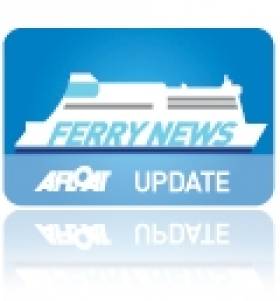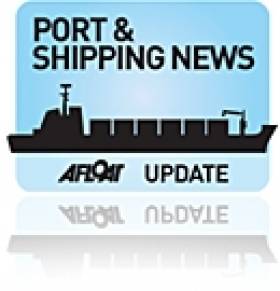Displaying items by tag: Zeebrugge
Seatruck Sailings Start on Dublin-Heysham Route
The vessel has accommodation for 12 drivers. Most of the daily sailings depart Dublin at 15:15hrs and return from the Lancashire port at 02:15hrs. On certain days the schedules vary, to view the timetable click here.
In addition to the new route for Seatruck Ferries, the freight-only operator has a fleet of 8 vessels on routes between Dublin-Liverpool, Warrenpoint-Heysham and Larne-Heysham.
Anglia Seaways arrived into Dublin yesterday morning from Avonmouth Docks, where the 120 unit capacity vessel went into temporary lay-up period, since departing the Irish capital on 31 January (see related posting and photo).
The 13,073grt vessel revived the 8-hour route yesterday with an afternoon sailing bound for Heysham. The vessel was originally reported to be relocated to Baltic Sea operations, but with its charter to Seatruck, the DFDS Seaways funnel symbol of the Maltese cross was painted out.
Though, the Maltese cross can still be seen in Irish ports with calls made by sisterships, Dana Gothia (ex. Maersk Westland) and Dana Hollandia (formerly Maersk Waterford) which are part of the DFDS Group container subsidiary DFDS Logistics.
In total the Lo-Lo shipping division operates four vessels on several routing options with weekly calls to Belfast, Dublin, Cork and Waterford to Rotterdam and Zeebrugge.
The German built sisters originally operated Dublin-Rotterdam and Waterford-Rotterdam routes for Norfolk Line (a subsidiary of Maersk / A.P. Moller Group).Incidentally Maersk /Norfolkline also owned the Anglia Seaways until DFDS Seaways purchased the vessel last year.
Car-Sales Boost Brings Busy Day to Dublin
Normally the Pauline operates on other routes. She along with her sister Yasmine are the largest vessels in the Compagnie Luxemburgeoise de navigation SA (CLnd) / Cobelfret fleet. The vessels are of the Con-Ro design, also known as the 'HumberMax' vessels which have 5,632 lane metres capable of carrying 258 container trailers and 656 cars.
Apart from the Dublin debut of the Pauline which docked at Ocean Pier, the final vessel of the trio, Celestine (1996 / 23,986grt) was the first to arrive from Zeebrugge, docking at the ferryport berth 51A (also used daily by Stena Line vessels). Like the Pauline, the Opaline (2009 / 25,235grt) docked at Ocean Pier and is the newest and last of six newbuilds built from German yard of FGS Flensburg.
CLnD won the Short-Sea Shipping Company Award in 2010 at the Irish Exporter Awards in November and hosted by the Irish Exporter Association (IEA). The award was sponsored by the Irish Maritime Development Office (IMDO) which recognises the strategically important role of short sea shipping to our island economy.
There are four sailings operated by CLnD between Dublin Port and Rotterdam / Zeebrugge. From the Dutch port there are onward sailings linking Göteborg and Esbjerg while the Belgian route connects the UK ports of Killingholme, Purfleet and Ipswich.
The development of the Irish routes are part of the "Motorways of the Sea", an EU-wide programme to promote a modal shift of goods from congested roads to alternative sea transportation. In addition to the concept is the international trend in the use of larger and more efficient vessels.
In October 2009 CLnD /Cobelfret switched their Irish operations from Rosslare to Dublin Port. The transfer to Dublin allowed CLnD to introduce larger tonnage at the then newly upggraded No. 2 ro-ro linkspan at Ocean Pier, Alexandra Basin East.
CLdN ro-ro SA and CLdN ro-ro UK offer ro-ro connections from Belgium and the Netherlands to the UK, Ireland, Sweden and Denmark. Both divisions share a combined core fleet of 20 vessels. Some ships including the Pauline are registered and flagged from land-locked Luxembourg. The fleet operate on short sea ro-ro trade routes, occasionally supplemented by time chartered tonnage, which accommodate trailers, containers, vehicles and other rolling equipment.

























































